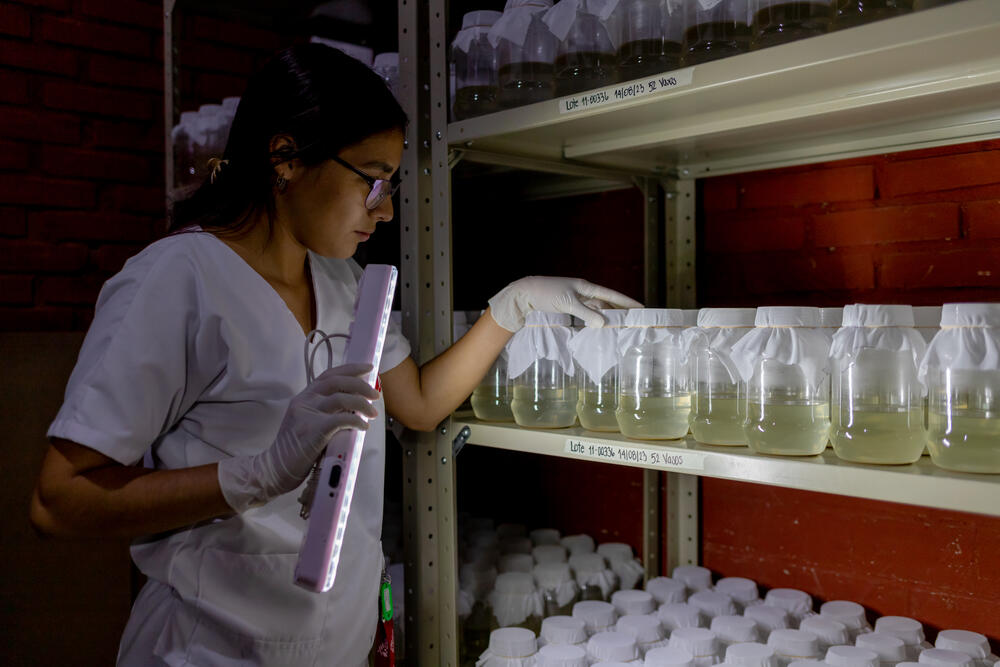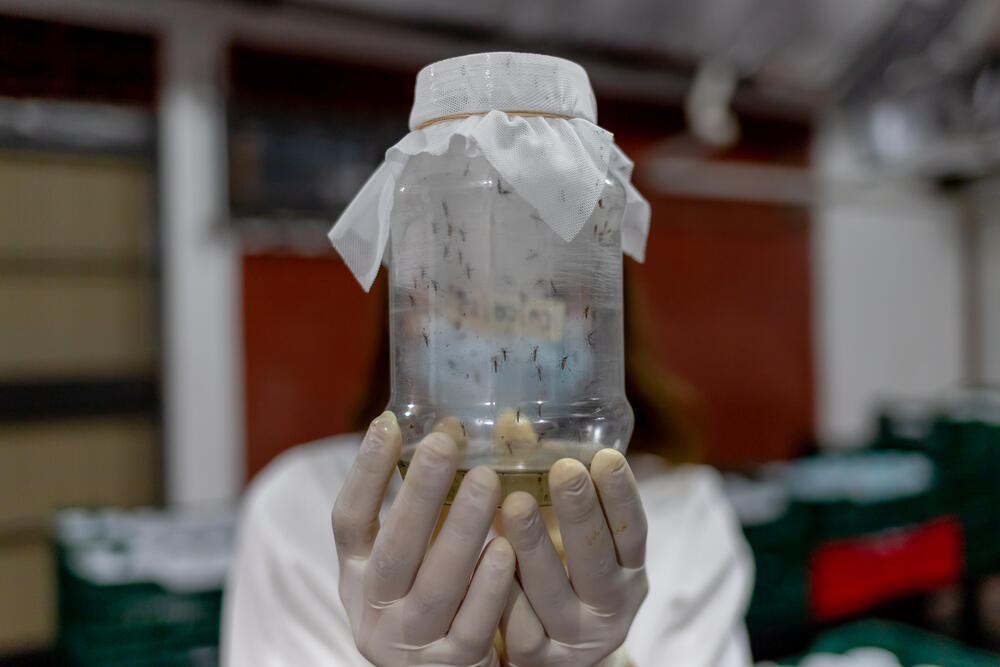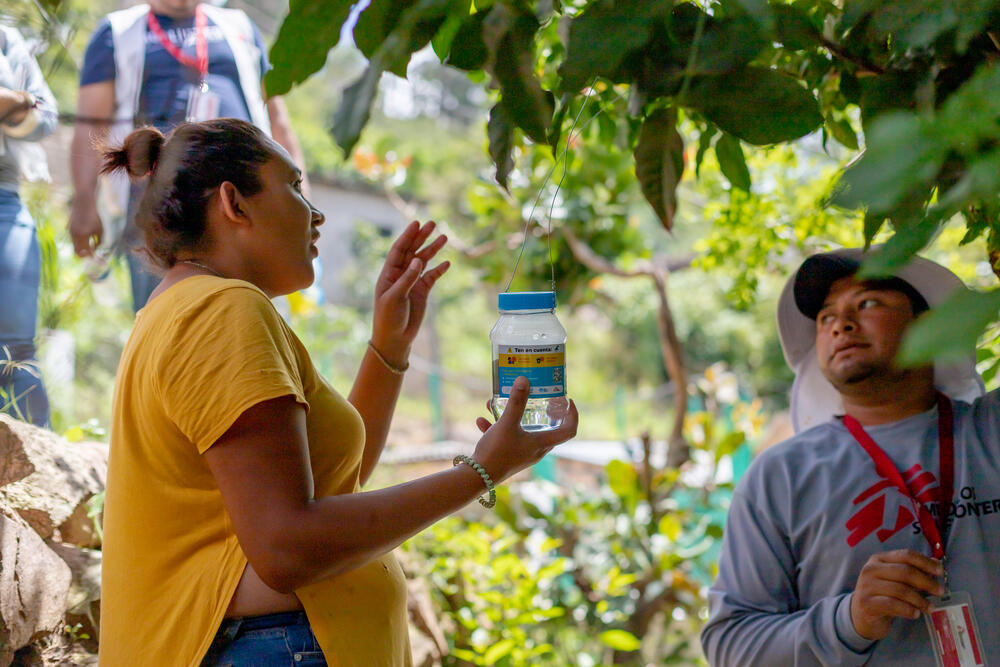Honduras: Using mosquitos to fight... mosquitos?
Mosquito-borne diseases like dengue fever can be fatal, but a new health project has a secret weapon...
For Victoria, a mosquito bite was the beginning of an almost-fatal nightmare. “At first it was fever, then joint pain that was so bad I couldn’t move. When the bleeding started, I thought I was going to die, and all I wanted was to survive to be able to take care of my daughter,” she explains.
Victoria lives in one of the most populated neighbourhoods in Tegucigalpa, the capital of Honduras. Houses made of concrete and sheet metal cluster around steep, dirt roads. Despite the presence of nearby forests and ravines, water remains a scarce commodity for the local community. The stagnant water that is available is a breeding ground for mosquitoes…
A deadly disease
This year alone, more than 9,200 cases of dengue fever have been reported in the Honduran capital. Current prevention tools are not sufficient to protect people from dengue, there are no specific treatments currently available and no vaccines have yet been produced that provide sufficient protection against infection. Like the better known Zika virus, dengue is transmitted through mosquito bites. Its consequences are well known by the community in this area.
"My grandson was hospitalised and so sick that we expected the worst," says Sandra, who also lives in Tegucigalpa. Thankfully her grandson recovered, but Sandra says her family has suffered several cases of dengue, some very severe.
These painful experiences have prompted Victoria and Sandra to join a group of community leaders who have come together to fight dengue in their neighbourhood. Today they are working shoulder to shoulder with Médecins Sans Frontieres / Doctors Without Borders (MSF) on an innovative project to prevent this disease.
A new approach
"For years MSF has conducted emergency interventions to deal with dengue outbreaks in this area," explains Edgar Boquin, project coordinator. "But research shows that the usual methods like fumigation are no longer effective to stop the spread."
This new approach has a secret weapon: mosquitos themselves.
Wolbachia is a bacterium found naturally on around 50 percent of insects. It competes with viruses like dengue, making it harder for them to reproduce in the insect.
Crucially, however, Wolbachia is not naturally occurring on the mosquitos that are spreading those diseases in Tegucigalpa.
This project is hoping to change that.
Here’s the plan...
The team are using mosquito eggs which have had the Wolbachia bacterium added in a laboratory, through technology developed by the World Mosquito Program.
The eggs will then be brought from our insectarium to the homes of volunteers like Sandra and Victoria. They will be in charge of monitoring the growth of the mosquitos, and of releasing them into the community. More mosquitos will be released once a week for six months.
Adding more mosquitos to the environment might sound counter-intuitive. But as those carrying Walbachia mate with the existing population, they will create new generations that will reduce the transmission of diseases.
£84 could pay for an MSF biomedical scientist working for a day
The generosity of people like you means expert MSF teams can deliver essential medical care to people across the world.
What do local people think?
“At first I had a lot of questions about this MSF project,” admits Sandra. “Last year we were working with MSF on fumigation to eliminate mosquitoes during the dengue emergency. So, when they came telling us that we’re not going to eliminate them anymore, but rather that more would be released, it was quite a big change!”
After multiple community workshops and informational meetings with MSF's health promotion teams, Sandra has gone from feeling hesitant to feeling confident enough to promote the initiative to others.
So with community champions like Sandra and Victoria on board, and with lots of work from the health promotion and project teams, local people are supportive of the project. A recent survey of almost 500 people showed that 97 percent of the respondents agree that the plan should go ahead.
Will it work?
Until now, communities like Sandra and Victoria’s have been locked in an ongoing battle of trying to suppress the mosquitos with insecticides. One of the benefits of the Wolbachia method is that it is self-sustaining: the mosquitos will continue to mate and pass on the bacteria.
The approach has been recognised by the World Health Organization and used successfully in multiple countries, where more than 11 million people around the world continue to benefit. A recent randomised controlled trial in Indonesia showed a 77 percent reduction in dengue incidence and an 86 percent reduction in dengue admissions.
However, factors including environmental conditions and human population density mean the impact of the method can vary in different places. MSF is working in partnership with the Honduran Ministry of Health and the University of Honduras to see how Wolbachia is spreading and to understand the full impact on levels of Dengue and other diseases.
Sandra however, is optimistic: “The Wolbachia method is still difficult to explain to our neighbours, but we understand the potential to reduce the damage of dengue to our community and specifically to children, they are the ones who are most exposed and most risk,” she says. “Many people have accepted that dengue fever is something they must live with, but with this project we want to show there's another way.”
MSF in Honduras
We first worked in Honduras in 1974. Today, we treat victims of violence, including sexual violence, working with the Honduran Ministry of Health to provide emergency medical and psychological care in the capital, Tegucigalpa.
The long-running programme in Honduras focuses on assisting victims of violence. In 2022, we also worked in migrant communities and responded to emergencies, including a dengue outbreak.


